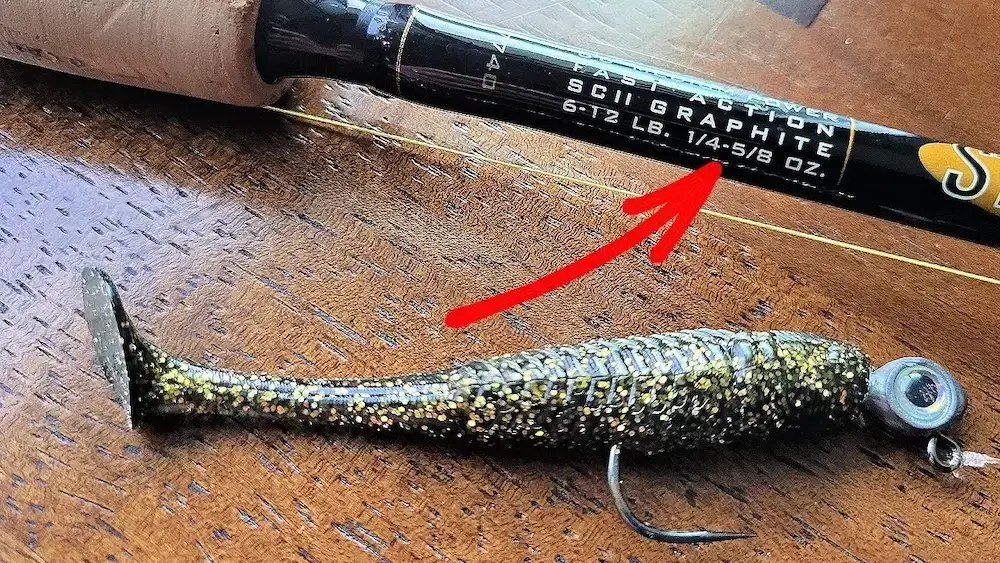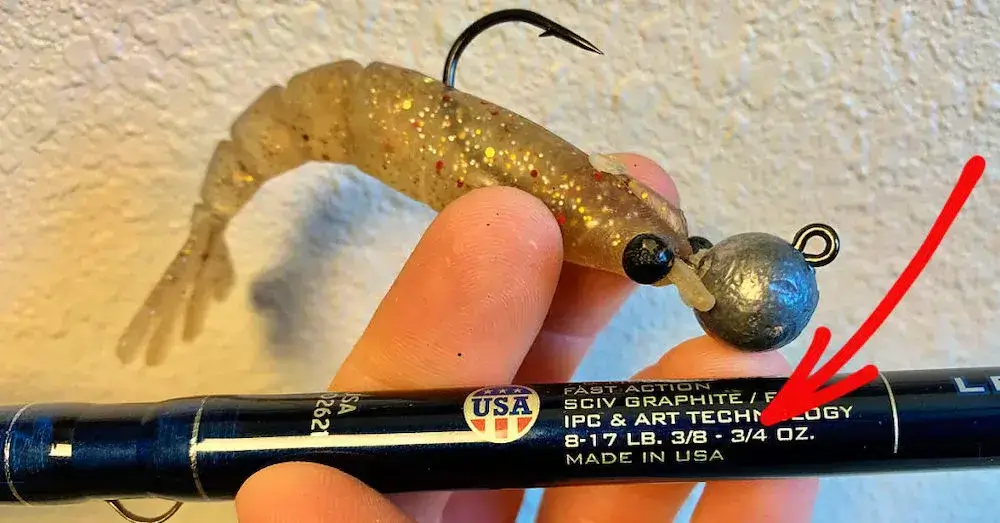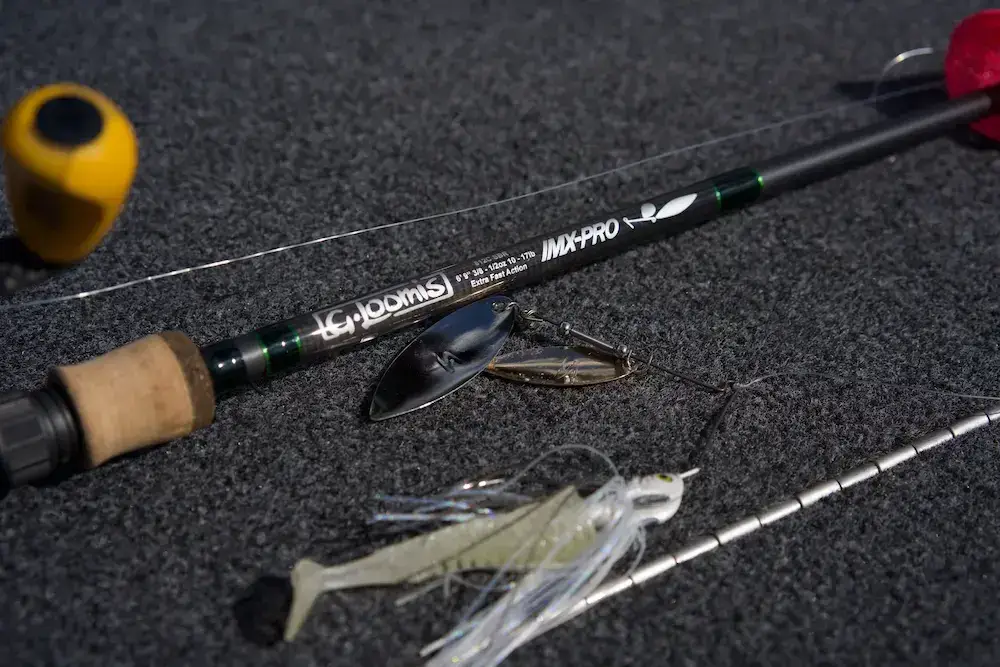If you’re a fisherman, you know that the weight of your lure is important. Different lures require different weights to be effective. If you don’t use the right weight, your lure won’t sink to where the fish are, and you’ll miss out on some catches.
This blog post will discuss lure weight and what it means for your fishing trips. We’ll also give you tips on choosing the right weight for your lures.
What Is Lure Weight on Fishing Rod and What Does It Do?

Lure weight on a fishing rod is the pressure the lure applies to the line when cast.
The heavier the lure, the more pressure it will apply and the faster it will travel through the air. Conversely, the lighter the lure, the less pressure it will apply and the slower it will travel.
Lure weight is important because it affects the distance the lure will travel when cast. It also affects how deep the lure will sink when it hits the water.
If you are fishing in a lake or pond, you will want to use a heavier lure so that it sinks to the bottom where the fish are. If you are fishing in a river or stream, you will want to use a lighter lure so that it floats on the surface where the fish are.
Lure weight is also important because it affects the action of the lure. A heavier lure will swim faster and deeper than a lighter lure. A lighter lure will swim slower and closer to the surface.
How to Determine the Right Lure Weight for Your Fishing Rod
The first thing you need to do is identify the type of fish you’re trying to catch. Different fish species prefer different lure weights. For example, if you’re targeting largemouth bass, a heavier lure weight is better because they strike harder and are more likely to take the bait.
On the other hand, if you’re going after trout, you want to use a lighter lure weight because they have a more delicate mouth.
Once you know what kind of fish you’re targeting, the next step is to match the lure weight to the rod strength. A good rule of thumb is that the heavier the lure, the stronger the rod should be.
Using a lighter lure, you can get away with a lighter rod. But if you’re using a heavier lure, you need a stronger rod to handle the weight and give you the power to cast it out.
What Are Some of the Most Common Lure Weights Used by Anglers?
Lure weight is one of those terms that gets thrown around a lot in the fishing world, but not everyone knows exactly what it means. Simply put, lure weight is the measurement of how much your lure weighs.
This information can be important for several reasons, including knowing how deep your lure will sink and what kind of fish you can target.
Lure weight is typically measured in ounces or grams. The most common weights used by anglers today are:
- One-eighth ounce
- One-quarter ounce
- Three-eighths ounce
- One half ounce
These weights will cover the majority of situations you’ll encounter while fishing. Of course, there are always exceptions to the rule, and you may find yourself needing a lighter or heavier lure at times. But for the most part, these four weights will serve you well.
How Does Changing the Lure Weight Affect Your Casting Distance?

The weight of your lure directly impacts the distance and accuracy of your cast. Heavier lures will travel further but may be more difficult to control. Lighter lures won’t travel as far but can be more easily controlled.
If you’re looking to increase your casting distance, using a heavier lure is the way. However, using a lighter lure is better if you’re trying to be more accurate with your casts.
Experiment with different lure weights and see what works best for you.
Tips for Using a Lure Weight to Increase Your Chances of Catching Fish
If you’re fishing with a lure, you’ll need to be aware of the weight of the lure.
The weight of the lure will affect how deep it sinks, how fast it sinks, and how well it swims. These factors can play a role in whether or not you catch fish.
Here are a few tips for using a lure weight to increase your chances of catching fish:
- Use a heavier lure if you want it to sink faster. This can be helpful when fishing in deep water or around submerged objects.
- Use a lighter lure if you want it to sink more slowly. This can be helpful when fish are near the surface or in shallow water.
- Use a heavier lure if you want it to swim faster. This can be helpful when fish are active, and you want to trigger a reaction bite.
- Use a lighter lure if you want it to swim more slowly. This can be helpful when fish are inactive, or you’re fishing in clear water where stealth is important.
- Experiment with different weights and see what works best for you in each situation.
Remember, the weight of your lure is just one factor that can affect your success when fishing. But it’s an important factor to keep in mind, so use these tips to help you choose the right weight for each fishing situation.
Examples of Different Types of Lures Weights and How They Are Used
Fishing lures come in all shapes, sizes, and colors. They are made of different materials and have different weights. The weight of a lure is important because it affects how the lure behaves in the water.
A heavier lure will sink faster and stay down in the water column longer than a lighter lure. A lighter lure will float to the surface more quickly and be easier to control.
There are three main types of lure weights:
- Heavy lures: Heavy lures are typically used in deep water or fishing for large fish. They sink quickly and stay down in the water column, making them ideal for reaching fish hiding in underwater structures or near the bottom of the water.
- Light lures: Light lures are typically used in shallow water or when fishing for small fish. They float to the surface more quickly and are easier to control, making them ideal for fishing in areas with lots of vegetation or near the shore.
- Floating lures: Floating lures are designed to float at the water’s surface. They are typically used in shallow water or when fishing for surface-feeding fish. Floating lures are easy to see and can be used to target fish feeding on the water’s surface.
Now that you know about the different lure weights, you can experiment with weights to see what works best for your fishing situation.
Try using a heavier lure in deep water or when fishing for large fish, and use a lighter lure in shallow water or when fishing for small fish. You may also want to try using a floating lure in shallow water or fishing for surface-feeding fish.
The Benefits of Using a Heavier Lure Weight

If you’re looking to add more weight to your lures, consider using a heavier lure weight. Here are some benefits of doing so:
- You’ll be able to cast your line further. This is especially helpful if you’re trying to reach fish located in deeper waters.
- Heavier lure weights are less likely to be pulled under by the current. This means that you’ll be able to keep your lure in the strike zone for longer, giving you a better chance of landing a fish.
- The added weight can also help increase the action of your lure, making it more enticing for fish.
- Heavier lure weights are also great for fishing in windy conditions. The added weight will help to keep your line from being blown around by the wind.
- If you’re fishing with live bait, a heavier lure weight can help to keep your bait in the strike zone for longer. However, the added weight will cause the bait to sink more slowly.
As you can see, there are many benefits of using a heavier lure weight. If you’re looking to add more weight to your lures, consider using a heavier lure weight. You’ll be able to enjoy all of the benefits of doing so.
Final Thoughts
Lure weight is extremely important when it comes to fishing. It can be the difference between a successful day out on the water and a disappointing one.
Hopefully, this article has helped you understand everything you need to know about lure weight and how it affects your fishing rod.
With this knowledge, you’ll be able to make better decisions when choosing lures and rigs for your next fishing adventure.

